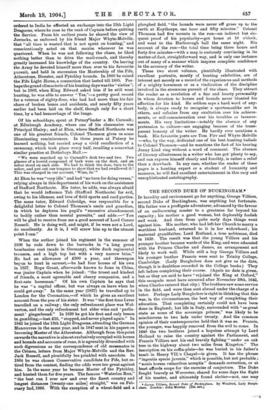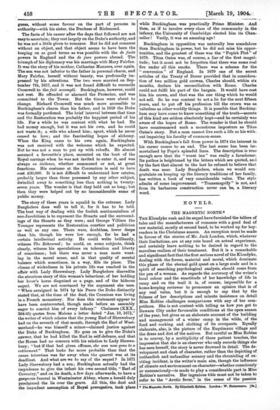Jr heredity and environment go for anything, George Villiers, second
Duke of Buckingham, was anything but fortunate. His father was a profligate adventurer, advanced by the favour of an undiscerning master to a greatness far beyond his capacity ; his mother a good woman, but deplorably foolish and weak. And then from quite early days things went against him. His mother, who had left her Church to marry a worthless husband, returned to it in her widowhood ; his maternal grandfather, Lord Rutland, a true nobleman, died in 1639. The result was that the young Villiers and his younger brother became wards of the King, and were educated with the Princes Charles and James, an arrangement not likely to work well. While still a boy George Villiers and his younger brother Francis were sent to Trinity College, Cambridge. (Lady Burghclere does not give us the date, though it is doubtless recorded in the College books.) They left before completing their course. (Again no date is given, but as they are said to have "rejoined the King at Oxford," this escapade must have occurred after November 29th, 1642, when Charles entered that city.) The brothers saw some service in the field, and were then sent abroad under the charge of a tutor. Perhaps Lady Burghclere is right in thinking that this was, in the circumstances, the best way of completing their education. That completing certainly could not have been done in England; but life in Italy, surrounded with " as great state as some of the sovereign princes," was likely to be mischievous to two lads under twenty. And the common opinion of their contemporaries held that it was so. Francis, the younger, was happily removed from the evil to come. In 1648 the two brothers joined a hopeless attempt by Lord Holland to raise the country against the Parliament, and Francis Villiers met his end bravely fighting "under an oak tree in the highway about two miles from Kingston." The inscription on his coffin-plate—he was buried in his father's tomb in Hem-y VIL's Chapel—is given. It has the phrase " ingentis specie juvenis," which is possible, but not probable ; " nonis horem vnlneribus acceptis " demands correction, or at least affords scope for the exercise of conjecture. The Duke fought bravely at Worcester, shared for some days the flight of his master, and ultimately found shelter—not, one may
• George Villiers, Second Duke of Buckingham. By Winifred, Lady Burgh.
dere. London John Murray. net.]
guess, without some favour on the part of persons in authority—with his sister, the Duchess of Richmond.
The facts of his career after the days that followed are not easy to ascertain; they rest largely on the Duke's authority, and he was not a little given to romance. But he did not romance without an object, and that object seems to have been the keeping on as good terms as was possible with the de facto powers in England and the de jure powers abroad. The triumph of his diplomacy was his marriage with Mary Fairfax. It was the story of his mother, Catharine Manners, over again. The son was not inferior to the father in personal charm, and Mary Fairfax, herself without beauty, was profoundly im- pressed by his attentions. The two were married on Sep- tember 7th, 1657, and it was not found difficult to reconcile Cromwell to the fait accompli. Buckingham, however, could not rest. He offended or alarmed the Protector, and was committed to the Tower. But the times were about to change. Richard Cromwell was much more accessible to Buckingham's charm than his father, and in 1659 the Duke was formally pardoned. The brief interval between that time and the Restoration was probably the happiest period of his life. For a while he was content with what he had. He had money enough, but it was not his own, and he could not waste it; a wife who adored him ; sport, which he never ceased to love ; and the fascinating hopes of alchemy. When the King came to his own again, Buckingham was not received with the welcome which he expected. But he was not a man to put up with rebuffs. He almost assumed a favourite's place, mounted on the boot of the Royal carriage when he was not invited to enter it, and was always en evidence, whether summoned or not, at great functions. His costume at the Coronation is said to have cost £30,000. It is not difficult to understand how estates, probably larger than those possessed by any other subject, dwindled away to something less than nothing in twenty- seven years. The wonder is that they held out so long ; but then they were helped out by no inconsiderable sums of public money.
The story of these years is squalid in the extreme. Lady Burghclere does well to tell it, for it has to be told. The best way of dealing with the foolish sentimentalism of neo-Jacobitism is to represent the Stuarts and the surround- ings of the Stuarts as they were ; and George Villiers the Younger represents the Restoration courtier and politician as well as any one. There were, doubtless, lower deeps than his, though his were low enough, for he had a certain intellectual activity. He could write brilliantly, witness The Rehearsal ; he could, on some subjects, think clearly, witness his speculations on toleration and liberty of conscience ; but there was never a man more want- ing in the moral sense, and in that quality of mental balance which sometimes, in a way, fills its place. The climax of wickedness in his private life was reached in the affair with Lady Shrewsbury. Lady Burghclere discredits the atrocious story of this woman's behaviour, of her holding her lover's horse disguised as a page, and of the hideous sequel. We are not convinced by the argument she uses. "When arraigned in 1674 by his Peers the Duke distinctly stated that, at the time of the duel, the Countess was living in a French monastery. Nor does this statement appear to have been controverted, though made before an assembly eager to convict him of every infamy?' Chalmers (XXX., 364-65) quotes from Malone a letter dated "Jan. 10, 167," the writer of which relates that the young Earl of Shrewsbury had on the seventh of that month, through the Earl of West- morland—he was himself a minor—claimed justice against the Duke of Buckingham. He goes on to give the Duke's answer, that he had killed the Earl in self-defence, and that the House had no concern with his relation to Lady Shrews- bury; "but if that had given offence, she was now gone to a retirement." That looks far more probable than that the causa teterrima was far away when the quarrel was at its deadliest. And what are we to say of the sequel ? In 1671 Lady Shrewsbury had a son; Buckingham actually had the impudence to give the infant his own second title, "Earl of Coventry," and on its death, a few days afterwards, to have a gorgeous funeral in Westminster Abbey, where a herald duly proclaimed the lie over the grave. All this, the duel and the impudent assumption of Royal prerogative. took Place
while Buckingham was practically Prime Minister. And then, as if to involve every class of the community in the infamy, the University of Cambridge elected him its Chan- cellor! Verily, it was an amazing age !
Buckingham in opposition was naturally less scandalous than Buckingham in power, but he did not miss his oppor- tunities, and the greatest of these was the "Popish Plot" of 1678. Titus Oates was, of course, a liar of the first magni- tude; but it must not be forgotten that there was some real fire under all this smoke. There was a scheme for the "conversion" of England. In 1670 one of the secret articles of the Treaty of Dover provided that in considera- tion of two million gold crowns, Charles should, within six months, declare his reconciliation with Rome. Charles could not fulfil his part of the bargain. It would have cost him his crown, and that was the one thing which be would not sell. So he was content to act a lie for the next fifteen years, and to put off his profession till the crown was as valueless as other worldly things. It is possible that Bucking- ham may have come to know something of the truth—secrets of this kind are seldom absolutely kept—and he certainly was aware of the hopes of Rome. The wonder is that he should have countenanced such a monstrous imposture as Titus Oates's story. But a man cannot live such a life as his with- out impairing his faculty of common-sense.
With Buckingham's fall from power in 1674 the interest in his career comes to an end. The last scene has been im- mortalised by Pope's splendid lines. The description is true enough save that the "worst inn" was really a farmhouse. Its pathos is heightened by the letters which are quoted, and by the fact that almost to the last he refused to believe that death was near. Lady Burghclere, whom we would con- gratulate on keeping up the literary traditions of her family, has written a book of very considerable value. The style admits of some improvement. " Transmogrify " is not, and from its barbarous construction never can be, a literary word.











































 Previous page
Previous page